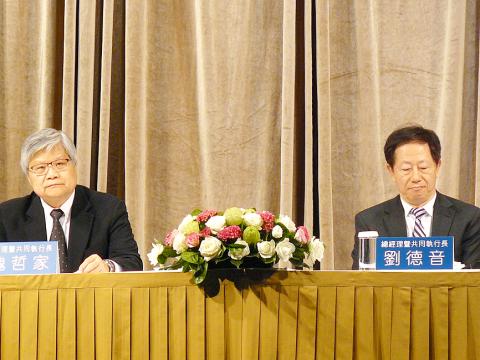Taiwan Semiconductor Manufacturing Co (TSMC, 台積電) yesterday again raised its capital spending to cope with stronger-than-expected mobile phone demand.
The company plans to spend between US$9.5 billion and US$10.5 billion this year, up about 5 percent from April’s estimate of between US$9 billion and US$10 billion.
The capital spending increase will be “mainly for 10-nanometer [nm] and 7nm [technologies],” TSMC chief financial officer Lora Ho (何麗梅) told investors. “We see a stronger mobile [chip] demand than we expected. We need to build more capacity next year.”

Photo: CNA
TSMC plans to ramp up production of 10nm technology in the first quarter next year and 7nm in 2018.
The company expects to grab more than a 70 percent share of the 10nm segment worldwide next year, Ho said.
“Apple Inc and Mediatek Inc (聯發科) will be early adopters [of TSMC’s 10nm technology] in the first half of 2017,” BNP Paribas SA analyst Laura Chen (陳佳儀) said in a report on Wednesday.
“We believe TSMC will sustain its leading position globally in 10nm and 7nm and onward,” Chen said.
TSMC co-chief executive officer Mark Liu (劉德音) yesterday predicted that the company’s revenue would expand at a compound annual growth rate of between 5 and 10 percent in the next five years, outpacing expected growth in the global semiconductor industry of 2 or 3 percent.
The company said the smartphone segment would be one of its major growth drivers going forward, despite smartphone growth having slowed over the past six quarters, Liu said.
Liu said he expects TSMC’s smartphone chip revenue contribution to move higher than the current 55 percent in the next five years.
For this quarter, TSMC expects revenue to increase by as much as 15.86 percent to NT$257 billion (US$8.01 billion) from last quarter’s NT$221.81 billion.
Ho attributed the growth to customers’ new product launches and persistent inventory buildup, primarily for Android-based phones.
Gross margin is expected to stand at between 50 and 52 percent this quarter, compared with last quarter’s 51.5 percent, while operating margin could be between 39.5 percent and 41.5 percent, following last quarter’s 41.2 percent, Ho said.
In the April-to-June quarter, TSMC reported a record profit of NT$72.51 billion, up 11.9 percent from NT$64.76 billion in the previous quarter and beating Daiwa Capital Markets’ estimate of NT$68.42 billion and NT$66.3 billion predicted by BNP Paribas.
However, last quarter’s profit fell 8.7 percent year-on-year.
Earnings per share were NT$2.8 in the second quarter, compared with NT$2.5 in the first quarter and NT$3.06 in the same period last year.
In the second quarter, chips made using 16nm or 20nm technology accounted for 23 percent of TSMC’s total revenue, while chips made using 28nm technology made up 28 percent, the company said.
TSMC shares were unchanged at NT$168.5 yesterday.

Semiconductor shares in China surged yesterday after Reuters reported the US had ordered chipmaking giant Taiwan Semiconductor Manufacturing Co (TSMC, 台積電) to halt shipments of advanced chips to Chinese customers, which investors believe could accelerate Beijing’s self-reliance efforts. TSMC yesterday started to suspend shipments of certain sophisticated chips to some Chinese clients after receiving a letter from the US Department of Commerce imposing export restrictions on those products, Reuters reported on Sunday, citing an unnamed source. The US imposed export restrictions on TSMC’s 7-nanometer or more advanced designs, Reuters reported. Investors figured that would encourage authorities to support China’s industry and bought shares

TECH WAR CONTINUES: The suspension of TSMC AI chips and GPUs would be a heavy blow to China’s chip designers and would affect its competitive edge Taiwan Semiconductor Manufacturing Co (TSMC, 台積電), the world’s biggest contract chipmaker, is reportedly to halt supply of artificial intelligence (AI) chips and graphics processing units (GPUs) made on 7-nanometer or more advanced process technologies from next week in order to comply with US Department of Commerce rules. TSMC has sent e-mails to its Chinese AI customers, informing them about the suspension starting on Monday, Chinese online news outlet Ijiwei.com (愛集微) reported yesterday. The US Department of Commerce has not formally unveiled further semiconductor measures against China yet. “TSMC does not comment on market rumors. TSMC is a law-abiding company and we are

FLEXIBLE: Taiwan can develop its own ground station equipment, and has highly competitive manufacturers and suppliers with diversified production, the MOEA said The Ministry of Economic Affairs (MOEA) yesterday disputed reports that suppliers to US-based Space Exploration Technologies Corp (SpaceX) had been asked to move production out of Taiwan. Reuters had reported on Tuesday last week that Elon Musk-owned SpaceX had asked their manufacturers to produce outside of Taiwan given geopolitical risks and that at least one Taiwanese supplier had been pushed to relocate production to Vietnam. SpaceX’s requests place a renewed focus on the contentious relationship Musk has had with Taiwan, especially after he said last year that Taiwan is an “integral part” of China, sparking sharp criticism from Taiwanese authorities. The ministry said

US President Joe Biden’s administration is racing to complete CHIPS and Science Act agreements with companies such as Intel Corp and Samsung Electronics Co, aiming to shore up one of its signature initiatives before US president-elect Donald Trump enters the White House. The US Department of Commerce has allocated more than 90 percent of the US$39 billion in grants under the act, a landmark law enacted in 2022 designed to rebuild the domestic chip industry. However, the agency has only announced one binding agreement so far. The next two months would prove critical for more than 20 companies still in the process